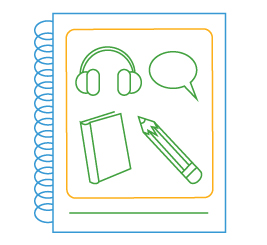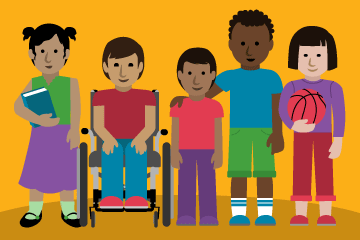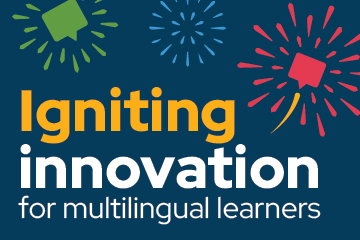Resources/Recursos
Featured Resources



All resources/Todos los recursos
Marco ALE: Aplicación para la enseñanza
Marco de referencia de las artes del lenguaje del español de WIDA: Aplicación para la enseñanza is the first Spanish language arts framework of its kind in the United States. This document serves as a guide to learn more about the elements of Marco ALE and how to apply them in the teaching of Spanish language arts. Note: This is a sample of the document. Visit the WIDA Store to purchase the complete version.
Written in Spanish with English summaries
Resource Details View Download NowMultilingual Children and Their Families
This WIDA Snapshot provides an overview of who multilingual children are, the benefits of promoting home language(s), and initial ideas for developing reciprocal partnerships with multilingual families.
Resource DetailsPerformance of Technology-Enhanced Items in Grades 1–12 English Language Proficiency Assessments
Technology-enhanced items (TEIs) are innovative, computer-delivered test items that are more authentic and interactive than traditional multiple-choice items (MCIs). This study examines the performance of grades 1–12 English learners on TEIs compared to MCIs on the reading domain of ACCESS for ELLs Online.
Published December 2020
Authors: Ahyoung Alicia Kim, Rurik L. Tywoniw, Mark Chapman
Planning for Languaging and Learning
In early care and education (ECE) settings, planning for multilingual children includes fostering the many ways we use language to make meaning of our environments, experiences, and learning. This WIDA Snapshot includes ideas for gathering information from families, community members, and classroom observations to use while planning.
Resource DetailsPracademics
By addressing the intersection of practice and academia, teachers are encouraged to be more involved in implementing evidence-based approaches and becoming more familiar with research informing their classroom practice directly. Engaging in pracademics highlights the work of teacher experiences and promotes the inclusion of practitioners' voices in the field.
Resource Details View Download NowPromoting Equity for Young Multilingual Children and Their Families
This Focus Bulletin invites early care and education (ECE) educators to promote equity for young multilingual children and their families. In the bulletin, we offer ideas for taking a language-focused approach to equitable caregiving and instructional practice in ECE settings. Also, we highlight voices from the field, and offer reflection questions to help you consider what it means to promote equity for multilingual children and their families.
Published February 2021
Authors: Amanda Spalter, Lorena Mancilla
Putting It All Together: Next Steps for Using the 2020 Edition
In this webinar, the WIDA standards development team discusses and models the tools, provided in the 2020 Edition, for initiating critical conversations with school leaders and colleagues.
Resource DetailsRecaudando y reflexionando sobre los objetivos lingüísticos y culturales de las familias
Este resumen informativo se enfoca en cómo puede recaudar información y reflexionar sobre los objetivos lingüísticos y culturales que las familias tienen para sus hijos/as.
Resource DetailsResponse to Instruction and Intervention for English Language Learners
Developing a Culturally and Linguistically Responsive Approach to Response to Instruction and Intervention (RtI²) for English Language Learners: Connecting to WIDA Standards, Assessments, and Other Resources
Response to Intervention or Responsiveness to Instruction (RtI) is one example of a multi-tiered system of support that helps educators identify the needs of all students as they develop more culturally and linguistically responsive educational systems. This guide includes tools and resources to help states, districts and schools address some of the unique needs of ELLs within a culturally and linguistically responsive RtI² system.
Resource Details View Download NowSample ACCESS for ELLs Individual Score Report (English)
This report provides information about the student’s scores on the ACCESS for ELLs English language proficiency test. This test is based on the WIDA English Language Development Standards and is used to measure students’ progress in learning English. Scores are reported as Language Proficiency Levels and as Scale Scores.
Resource Details View Download NowTool to Evaluate Language Complexity of Test Items
This paper focuses on the creation of an instructional hyper textbook that serves as a personal environment for learning a less-commonly-taught language, Turkish in this case. It shows how digital personal environments can advance self-regulated language learning in tandem with more formal learning strategies.
Resource DetailsTrauma Informed Considerations for Multilingual Learners
As teachers, staff and administrators in school buildings, district offices and educational agencies across the country, we play a critical role in responding to the individual needs of students in our teaching and learning settings. Trauma can be experienced by any student, but for those who are also learning English as an additional language or who are adjusting to a new culture, these experiences add another dimension of care to be addressed by educators. Through this focus bulletin, readers will be introduced to a research based guide for working with multilingual learners who may benefit from trauma informed practices, including discussions on special populations, the sharing of empowering and engaging strategies, a raising of awareness about prompting adverse behaviors, and building rapport across whole school, student and family networks.
Resource Details View Download NowUnderstanding the Proficiency Level Descriptors of Marco DALE
Los descriptores del desempeño lingüístico in Marco DALE provide guidance on how bi/multilingual students can develop language that they can interpret, interact and express in each of the communication modes (interpretative, interactive and expressive).
Resource DetailsUsing Data and Research to Inform Practical Issues in EL Proficiency and Growth
This webinar examines ways in which large-scale assessment data can be used to extract important, practical and useful insights on average patterns and high-level trends in English learners’ education and academic outcomes.
Resource DetailsWhat can collaboration look like with the WIDA ELD Standards Framework?
Collaboration is one of the four Big Ideas of the WIDA ELD Standards Framework. This two-page "comic" strip shows the story of how a science teacher and an ESL teacher work together on their multilingual learners' language development and ways of meaningfully engaging with the content of a science unit. This step-by-step example can be used in tandem with Section 4 of the WIDA ELD Standards Framework, 2020 Edition, that has a more detailed look at the collaborative planning process.
Resource Details View Download NowWIDA All Year Long
Learn how WIDA is more than a test! Mr. Vega is a 6th grade EAL (English as an Additional Language) teacher at an international school who works with colleagues and families to support multilingual learners. Follow Mr. Vega all year long, as he focuses on what his students can do, using WIDA resources to collaborate and plan effective learning activities throughout the school year.
Resource Details View Download NowWIDA Alternate ACCESS Interpretive Guide for Score Reports
This guide provides a comprehensive explanation of the types of scores reported by Alternate ACCESS for students in grades K-12.
Resource Details View Download NowWIDA Alternate ACCESS: Understanding Your Child's Scores (multiple languages)
Send this flyer home with students along with the Alternate ACCESS Individual Student Report for Families. This flyer explains each piece of score information included in the report for families. Use this guide, available in multiple languages, to help parents/guardians understand what scores mean and how they are used.
Resource DetailsWIDA ELD Standards Framework, 2020 Edition - Grade 1 Materials
This resource includes the grade 1 materials that are part of the WIDA English Language Development Standards Framework, 2020 Edition. The materials specific to this grade level have been pulled together to provide educators of students in grade 1 with a smaller, more manageable booklet to support their implementation of the WIDA ELD Standards Framework in their classroom.
Resource Details View Download NowWIDA ELD Standards Framework, 2020 Edition - Grades 2-3 Materials
This resource includes the grades 2-3 materials that are part of the WIDA English Language Development Standards Framework, 2020 Edition. The materials specific to this grade-level cluster have been pulled together to provide educators of students in grades 2-3 with a smaller, more manageable booklet to support their implementation of the WIDA ELD Standards Framework in their classroom.
Resource Details View Download Now



